Low Budget Meal Ideas | Eating healthy on a budget can be a daunting task, especially on busy weeknights when time and energy are limited. The struggle to find meals that are quick, nutritious, and affordable is a common one. In this article, we present a collection of meal ideas designed to solve this problem. These recipes are not only easy to prepare but also packed with nutrients and gentle on your wallet. By the end of this read, you’ll have a repertoire of go-to dishes that make healthy eating a simple, achievable goal, even on the busiest of nights.
Tips for Low Budget Meal Ideas , Healthy Meal Planning
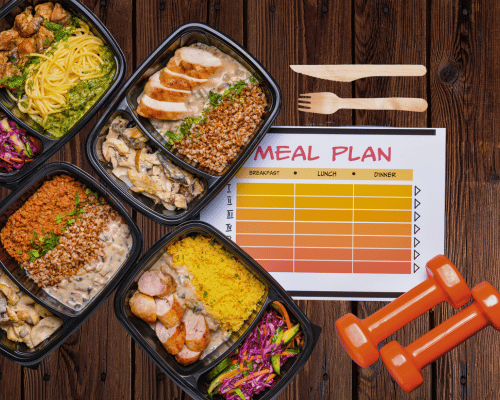
Importance of planning and shopping wisely
- Buy in bulk for staple items like grains, beans, and frozen vegetables to save money.
- Choose seasonal produce for fresher and cheaper options.
- Utilize sales and discounts by planning meals around what’s on offer.
Benefits of preparing meals in advance
- Spend a few hours each week prepping meals to save time on busy nights.
- Cook in batches and store portions in the freezer for quick, ready-to-eat meals.
- Pre-chop vegetables and marinate proteins to streamline the cooking process.
Quick and Healthy Low-Budget Dinner Recipes
Lentil and Vegetable Soup
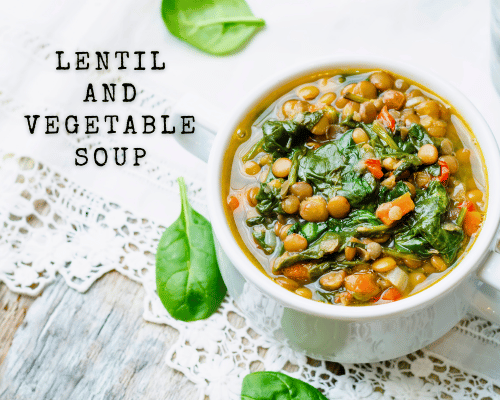
Ingredients: Lentils, carrots, celery, onions, tomatoes, garlic, spinach, broth, spices.
Instructions
- Saute onions, garlic, carrots, and celery in a pot.
- Add lentils, tomatoes, broth, and spices.
- Simmer until lentils are tender.
- Stir in spinach and cook until wilted.
Tips: Freeze leftovers for future meals.
Chickpea Stir-Fry
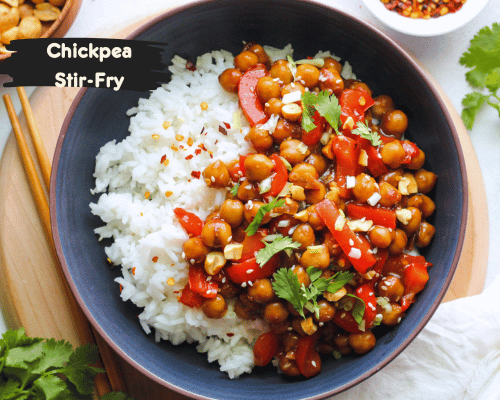
Ingredients: Chickpeas, bell peppers, broccoli, onions, soy sauce, garlic, ginger, rice.
Instructions
- Saute onions, garlic, and ginger.
- Add bell peppers and broccoli, and cook until tender.
- Stir in chickpeas and soy sauce.
- Serve over rice.
Tips: Use frozen vegetables to save time and money.
Baked Sweet Potatoes with Black Beans

Ingredients: Sweet potatoes, black beans, corn, salsa, avocado, spices.
Instructions
- Bake sweet potatoes until tender.
- Mix black beans, corn, and salsa.
- Top baked sweet potatoes with the bean mixture and avocado.
Tips: Add a side salad for extra nutrients.
Vegetable Fried Rice
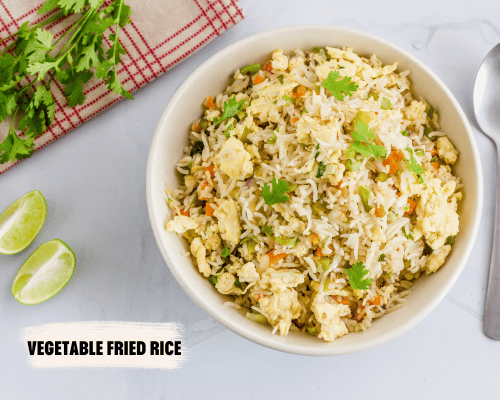
Ingredients: Cooked rice, mixed vegetables, eggs, soy sauce, garlic, ginger.
Instructions
- Saute garlic and ginger.
- Add vegetables and cook until tender.
- Stir in rice and soy sauce.
- Scramble eggs and mix them into rice.
Tips: Use leftover rice and veggies for a budget-friendly option.
Turkey and Spinach Stuffed Peppers
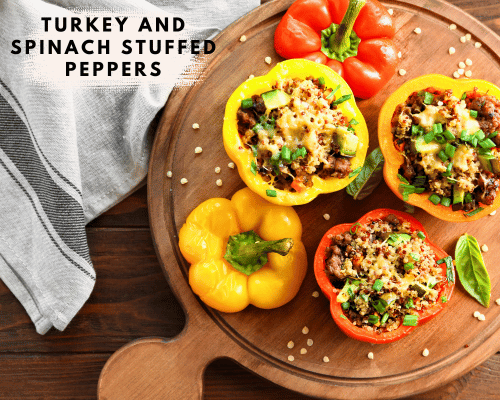
Ingredients: Bell peppers, ground turkey, spinach, quinoa, tomatoes, spices.
Instructions
- Cook ground turkey with spices.
- Mix in cooked quinoa, spinach, and tomatoes.
- Stuff mixture into bell peppers and bake.
Tips: Make extra for lunch the next day.
Whole Wheat Pasta with Marinara and Veggies
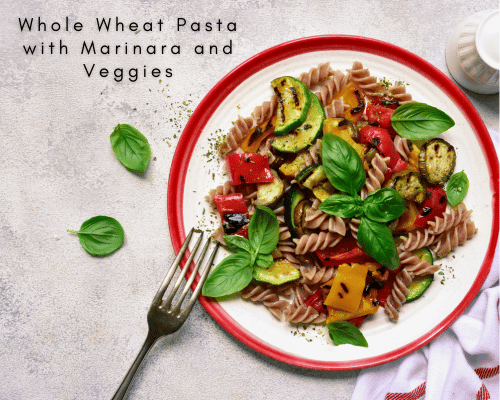
Ingredients: Whole wheat pasta, marinara sauce, zucchini, mushrooms, spinach, garlic.
Instructions
- Cook pasta according to package instructions.
- Saute garlic, zucchini, mushrooms, and spinach.
- Add marinara sauce and simmer.
- Mix sauce with pasta.
Tips: Add a sprinkle of cheese or nutritional yeast for extra flavor.
Quinoa and Black Bean Salad
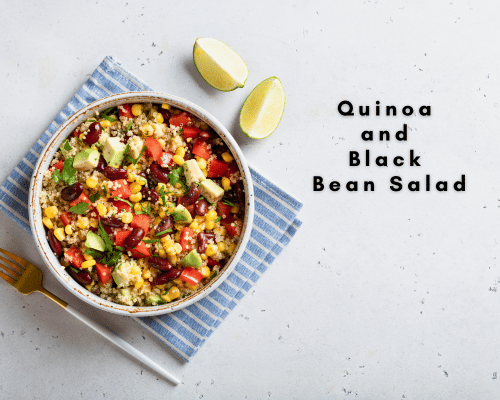
Ingredients: Quinoa, black beans, corn, bell peppers, cilantro, lime, spices.
Instructions
- Cook quinoa.
- Mix in black beans, corn, bell peppers, cilantro, and lime juice.
- Season with spices.
Tips: Serve with a side of tortilla chips.
Tuna and White Bean Salad
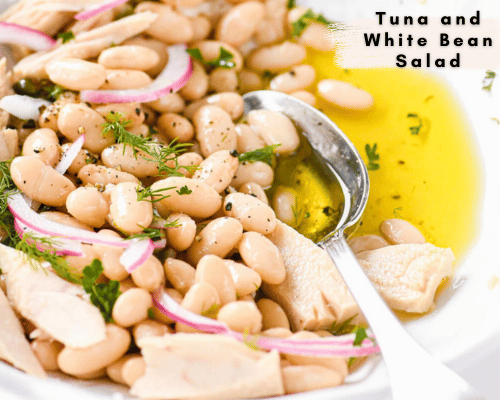
Ingredients: Canned tuna, white beans, red onion, celery, parsley, olive oil, lemon juice.
Instructions
- Mix tuna, white beans, red onion, celery, and parsley.
- Drizzle with olive oil and lemon juice.
- Toss to combine.
Tips: Serve with whole grain crackers or bread.
Budget-Friendly Cooking Hacks
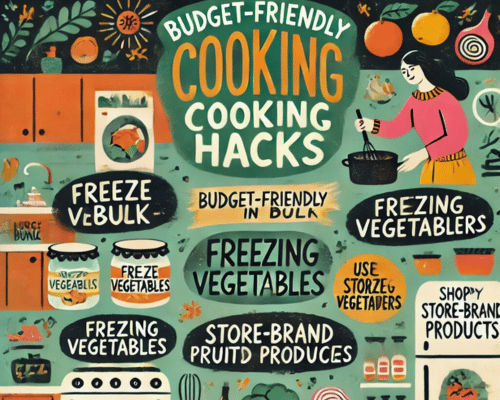
Using Pantry Staples
Keeping a well-stocked pantry is crucial for low-budget cooking. It ensures you have the essentials on hand to create a variety of meals without frequent shopping trips.
Essential Pantry Items
- Grains: Rice, pasta, quinoa, lentils.
- Canned Goods: Beans, tomatoes, tuna, broth.
- Spices: Salt, pepper, garlic powder, chili powder, cumin.
- Baking Essentials: Flour, sugar, baking soda, baking powder.
- Oils and Vinegar: Olive oil, vegetable oil, apple cider vinegar.
- Others: Peanut butter, oats, soy sauce, honey.
Minimizing Food Waste
Reducing food waste not only saves money but also maximizes the use of ingredients, ensuring you get the most out of what you buy.
Tips for Reducing Waste
- Repurposing Leftovers: Turn leftover vegetables into soups, stews, or stir-fries. Use leftover meat for sandwiches or salads.
- Using Every Part of Ingredients: Save vegetable scraps for making broth. Use citrus peels for zest in recipes or as natural cleaners.
- Proper Storage: Store food correctly to extend its shelf life. Use airtight containers for dry goods and keep produce fresh with appropriate storage methods.
- Creative Cooking: Experiment with new recipes that use leftover ingredients. Make smoothies from ripe fruits or frittatas from leftover veggies.
Balancing Nutrition on a Budget
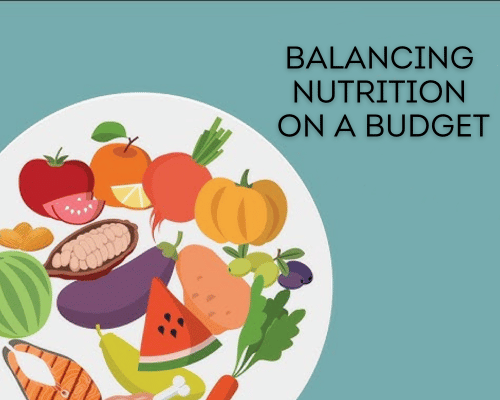
Protein Sources
Protein is essential for a balanced diet, and it can be affordable with the right choices.
Beans and Lentils: Rich in protein and fiber, these are versatile and inexpensive. Use them in soups, stews, and salads.
Eggs: Affordable and packed with protein. Great for breakfast, lunch, or dinner in dishes like omelets, frittatas, and sandwiches.
Canned Fish: Tuna, salmon, and sardines are cost-effective sources of protein and omega-3 fatty acids. Add them to salads, sandwiches, or pasta dishes.
Incorporating Vegetables
Vegetables are crucial for a balanced diet, providing essential vitamins, minerals, and fiber.
Frozen Vegetables: Often cheaper than fresh and just as nutritious. They’re pre-cut and can be added directly to dishes, saving time and reducing waste.
Seasonal Vegetables: Buying in-season produce can significantly reduce costs. Local farmers’ markets and grocery stores often have sales on seasonal items.
Versatile Uses: Use vegetables in various dishes like stir-fries, salads, soups, and casseroles to ensure a balanced intake. Keep vegetables fresh by proper storage methods and consider pickling or fermenting for longer shelf life.
In this guide, we’ve explored a variety of healthy, low-budget recipes and practical tips for busy weeknights. These meals are designed to be both nutritious and affordable, helping you eat well without breaking the bank. Give these recipes a try to simplify your weeknight dinners and maintain a balanced diet. Share your budget-friendly meal ideas in the comments, and follow our blog for more healthy cooking tips and delicious recipes.

Hey There, I’m Monica, Mom of two. This is my personal blog site. Here I write about Kitchen Tips Tricks, Recipes, and Review the products I use.
I hope you enjoy the article. Give me feedback on how I’m doing with my blog. I would appreciate it so much.
Have a great day! 🙂
[Follow me on Twitter]


